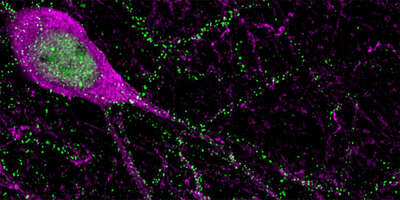Main Content
SPLICECODE - Alternative Splicing Codes for Synaptic Specificity
The SPLICECODE project funded by an Advanced Grant from the European Research Council explore the hypothesis that alternative splicing is a central mechanism for the amplification of molecular diversity in neuronal cells that underlies specification of functional neuronal circuits.
Neuronal networks represent arguably the most impressive example of a complex, highly organized system in our body. Chemoaffinity tags are envisioned to provide a code that would encompass the recognition of self versus non-self, recognition of sister cells, and enable to distinguish appropriate and inappropriate synaptic partners.
The finite number of protein-coding genes in the human genome severely limits the genetic resources that can be employed for generating molecular diversity and, thereby, neuronal recognition. In this ongoing project we are testing the hypothesis that alternative splicing is a central mechanism for the amplification of molecular diversity that underlies synaptic specificity. We implemented novel mass-spectrometry and sequencing methods to define transcript isoform repertoires in genetically-defined cells in mice (Schreiner et al. eLife, 2015; Furlanis et al., Nature Neuroscience, 2019). We are unravelling the logic of receptor and ion channel isoform repertoires and test the importance of cell type-specific alternative splicing programs for synaptic specificity (Traunmüller et al., Science, 2016).
In collaboration with SciCORE at the University of Basel we developed an extensive database on cell type-specific expression of transcript isoforms in the mouse cortex and hippocampus (SPLICECODE database) which is an important resource for functional studies on neuronal proteins.
Selected publications
Furlanis, Elisabetta; Traunmüller, Lisa; Scheiffele, Peter (2019). Landscape of ribosome-engaged transcript isoforms reveals extensive neuronal-cell-class-specific alternative splicing programs. Nature Neuroscience, 22(10), 1709-1717.
Furlanis, Elisabetta; Scheiffele, Peter (2018). Regulation of Neuronal Differentiation, Function, and Plasticity by Alternative Splicing. Annual review of cell and developmental biology, 7.1-7.19.
Traunmüller, Lisa; Gomez, Andrea M; Nguyen, Thi-Minh; Scheiffele, Peter (2016). Control of neuronal synapse specification by a highly dedicated alternative splicing program. Science, 352 (6288), 982-6.
Schreiner, Dietmar; Simicevic, Jovan; Ahrné, Erik; Schmidt Alexander; Scheiffele Peter (2015)
Quantitative isoform-profiling of highly diversified recognition molecules. eLife, 4, e07794




